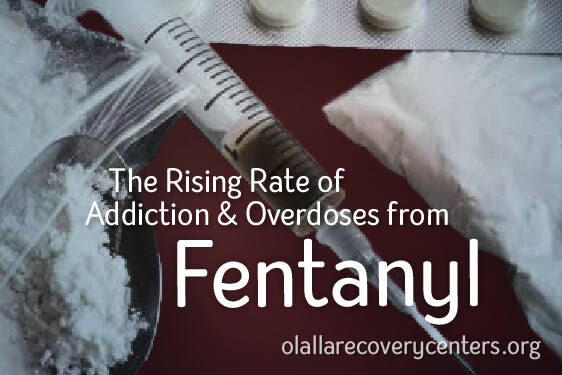
30 Aug Time to break the fentanyl addiction cycle
The opioids epidemic has been in the news a lot lately, as the concern about its impact has expanded into the political arena. With the dramatic increase in the number of deaths from opioid overdoses in recent years, fentanyl especially rose as a major concern because of how extremely dangerous this synthetic drug is.
If you know someone who is addicted to opioids or fentanyl specifically, you need to understand the urgency to get help for your loved one. Here are some facts you need to know:
- Often times, the opioid addiction stems from abusing legally prescribed drugs such as OxyContin, Percocet and Vicodin — which were liberally prescribed by physicians for many years starting in the 1990s.
- Those who are addicted to opioids turn to heroin for reasons like higher potency, cheaper street prices or better supply. The number of heroin-related overdose deaths in the U.S. has nearly tripled between 2010 and 2015.
- A new trend among illicit drug suppliers is to mix fentanyl into heroin as well as cocaine to amplify their potency. This trend is especially growing among the Mexican cartels, which are a primary supplier of fentanyl to the U.S. (along with China).
- Fentanyl is legally prescribed for acute or chronic pain for advanced-cancer patients, and like other opioids, the pharmaceutical version can be illegally obtained. There have been cases of physicians also prescribing it for off-label uses, such as chronic pain not related to cancer.
- Fentanyl is also available in its pure form on the street and has been growing more popular. In Washington state, for example, there has been an 86 percent increase in fentanyl-overdose deaths, and the majority of those did not involve heroin.
- Fentanyl is extremely deadly, and even minuscule amounts that are inhaled or absorbed through the skin can make a person ill. As little as 2 milligrams can kill.
- According to the CDC, fentanyl is 50 times more potent than heroin and 100 times more potent than morphine.
- Because the effects of fentanyl last a short time, it is highly addictive, and can become habit-forming even after a few uses.
The effects of fentanyl can include a weakened immune system, respiratory stress, anxiety and paranoia attacks, increased depression, gastrointestinal problems and shifts in mood or personality.
Here are some addiction signs to watch for:
- Weakness and fatigue confusion and problems with concentration
- Dizziness and drowsiness
- Shallow or weak breathing
- Swollen feet or hands
- Nausea and vomiting
If you suspect a loved one is addicted to fentanyl, don’t carry this burden alone. Call Olalla Recovery Centers, and one of our professionals can help you figure out what you can do next.
Fentanyl addiction may be a public-health issue, but breaking the cycle takes one person at a time. Please know that there are resources available to help you and your loved one break free of this devastating problem.


